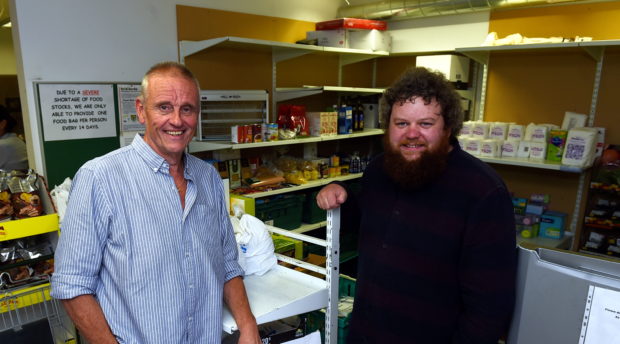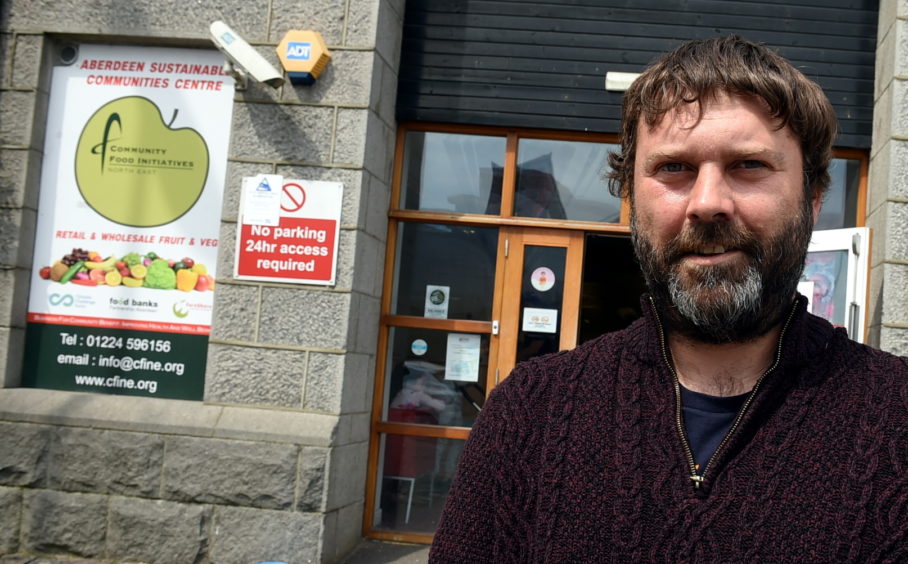Dedicated staff at a social enterprise are working to tackle the root causes of a national spike in foodbank use.
Recent figures collected by CFine show there has been a 60% increase in the number of emergency food parcels distributed between April 2018 and April 2019.
This April, the staff handed out 1,600 bags of goods to struggling families and individuals through their foodbank service, compared to the 1,000 parcels distributed in April 2018.
In the north-east, Aberdeenshire North Foodbank provided 4,236 emergency packs between June 2018 and 2019 – of which 1,321 (31%) went to children.
Bosses at the Aberdeen site have been developing a variety of schemes and services to tackle the issues that are pushing people into food poverty or food insecurity.
Dave Simmer, chief executive of CFine, said: “When we first started up the foodbank back in 2013, it was in anticipation of welfare reform.
“The majority of people coming to our foodbank to use our services are being driven there by the UK Government’s welfare reforms.
“Until there are changes in the benefits system at a UK level, no-one is going to be able to make a lasting impact on these numbers.”
Mr Simmer added: “This is also about the scale and complexity of the issues that people are coming in with.
“They may raise one issue, but after speaking to them you might hear about five different but equally serious issues they are struggling with.
“Many people who use our services have few family or friends, or none at all, and that makes them very isolated and lonely. That can have tremendous health impacts.
“Our approach is more holistic.
“We do of course have the foodbank for those emergencies. If people are hungry you have to give them food.
“But the problem with foodbanks is that they create dependency, they erode dignity and they don’t change anything.
“Arguably, you can even say we’re bolstering the welfare reform programme – though we are committed.
“This is why we have developed initiatives like the Safe team and the Woodside food pantry.”
The S.A.F.E. (support, advice, finance and education) support workers are onsite to help those who are facing financial difficulty or need help navigating the welfare system.
Neil Woodward, leader of the SAFE team, said one of the biggest problems faced by the clients he deals with on a daily basis is the technology barrier.
“There is still a stigma attached to walking into a foodbank,” he said.
“Last time I checked, there were 11,000 benefit claimants in Aberdeen. That’s from the statistics posted by the Department for Work and Pensions in November.
“What we are seeing is a move to a more technology-based system and people who aren’t as tech savvy do not feel in control.
“I only know one lady, aged 63, who has been allowed to claim over the telephone, but it’s very rare.
“A lot of people have never even used a computer.
“When the oil downturn happened, there were a lot of hands-on engineers who found themselves struggling and had barely used this technology before.”
Mr Woodward said other factors could lead an individual to turn a foodbank, such as financial anxiety, the waiting time between appointments and medical conditions.
Graeme Robbie is the manager for FareShare Grampian which works to ensure perfectly good in-date surplus from the food industry, that would otherwise go to waste, is redistributed throughout the community.
He said: “In this way we are tackling food waste, but we’re also tackling hunger by getting it out to charities and community organisations.
“Food is at the heart of what Cfine does, but it is always a means to an end – not an end in itself.”
Mr Robbie said there had been a year-on-year increase in demand for food since 2014, with their own foodbank experiencing “a consistently high level of demand”.
Despite the difficulties, Mr Simmers said the support from the public, business and corporate bodies through the toughest of times had been “overwhelming” and “heartwarming”.
He said: “It gives you hope for the future that there are so many people out there who care for neighbours who are less well off than them.
“To me, that’s what’s important. Without such support and the work of our volunteers we wouldn’t be able to function.”
Debbie Rennie, foodbank manager of Aberdeenshire North Foodbank, added: “No-one in this area should need a foodbank’s help and we want to see an end to local people needing emergency food at all.
“But until we reach a future where foodbanks are no longer needed, we’ll continue to provide vital support when and where it matters most.”
A DWP spokesman said: “The reasons for people using foodbanks are complex.
“The UK Government spends over £90 billion a year on support for those who need it, including those who are on a low income.
“In addition, Scotland has significant welfare powers and can top-up existing benefits, pay discretionary payments and create entirely new benefits altogether.”
To find out more about CFine’s Safe team, visit www.cfine.org/safe.
How the team helped to turn a struggling Aberdeen man’s life around
The Safe team relayed the story of how they helped a man, named only as Client A, after being told about his “frosty mannerisms” when asked if he would like any extra help at the food bank.
The team understood that his experiences with the DWP and the local authority had not been going well, and he “believed the world was against him”.
Once he understood the Safe team were not DWP workers, he started to open up and discuss his problems.
It transpired that the troubled man had missed a medical appointment and was at risk of losing his benefits.
Once he began to trust the crew, the man opened up about his emotional problems and staff managed to resolve the benefit issues which had been troubling him.
One member of staff contacted his GP and the social work department on his behalf and got him a new appointment in Aberdeen.
The man also relayed his concerns about drug abuse in the hostel where he was staying, and the Safet team helped him to move into his own council property that day.
A spokesman for the team said: “The client still comes to visit me often and I’m very happy to see the improvement in his situation, and a huge difference in his mental health now he has a foundation in his life to build on.
“This situation shows the advantage of workers who are not in direct employment with the DWP.
“Often clients will be worked up emotionally going into the DWP or the local council offices as they feel they must fight the system.
“I’m not so sure the client would have progressed so quickly if he did not have help outside the system.”

